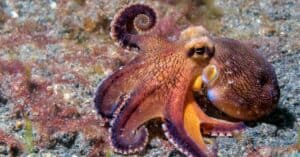Defining — and even detecting pain — is a pretty complicated issue. Since pain involves how we experience it and the emotions that come with it, we can’t exactly measure it empirically. Pain has its own special way of being felt and can be connected with feeling upset or distressed. So, just imagine how hard it is to measure pain in animals who cannot tell us they are hurting! So, do octopuses feel pain? Keep reading to find out!
The Problem with Pain
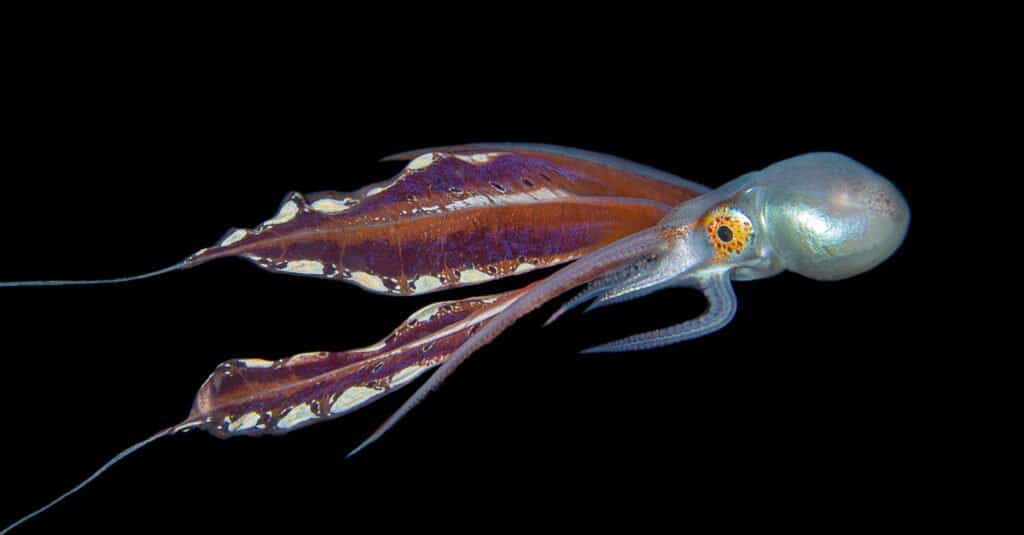
We know animals can feel physical pain, but emotional pain is quite different.
©Sam Robertshaw/Shutterstock.com
If you put your hand on a hot stone, you instantly pull it away. However, this “reaction” is actually just a reflex of the body — your body is reacting to the pain without actually involving your brain! When you touch a hot stove, you don’t consciously think, “Oh, that’s hot. I should remove my hand now.” Instead, your body’s reflexes move your hand for you. It’s an excellent protection strategy built into our physical makeup.
However, after this initial reaction to the hot sensation of the stove, we inevitably “feel” the pain that comes with the burn. There are two parts to actually feeling this pain:
- First, physical pain: You are consciously aware that something hurts (your hand is burned).
- Second, emotional pain: You feel bad about what happened, and you understand that it is the burn on your hand that is causing you discomfort.
It is this second part that tells us that we can feel emotional pain, not just physical pain. However, while many people accept that animals can feel physical pain, understanding if they can feel emotional pain is often more challenging.
Animals and Emotions
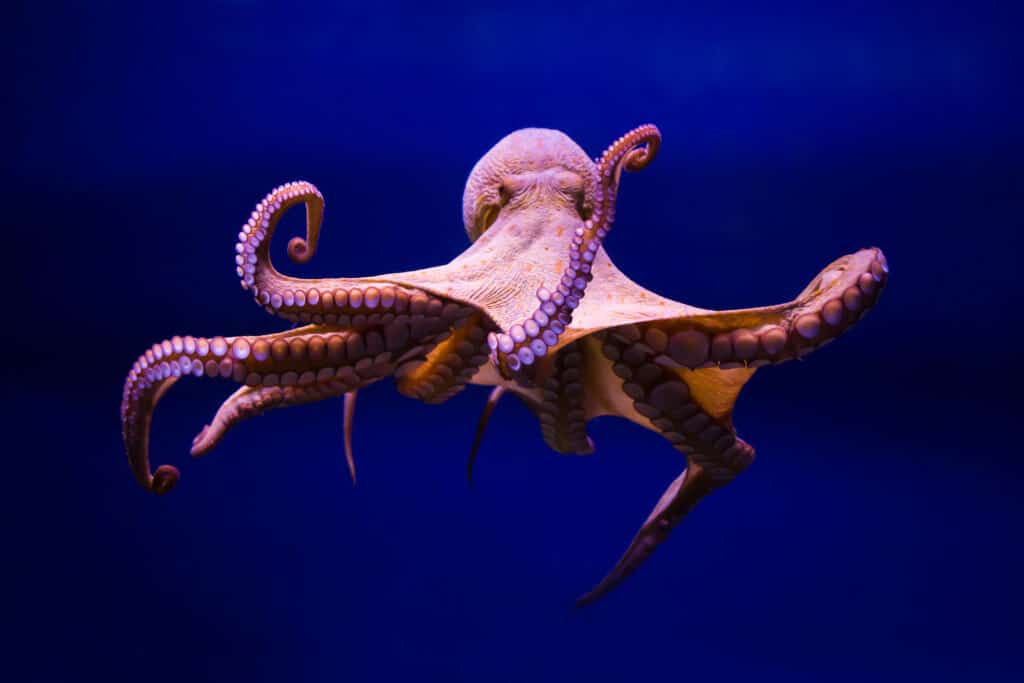
Scientists still study animal emotion in creatures like the octopus.
©iStock.com/:TheSP4N1SH
Today, we know that animals are entirely capable of feeling many different emotions, thanks to many advancements in animal behavior studies. However, many people in western cultures still have a hard time believing and understanding this idea. In fact, up until the 1980s, some scientists even struggled to understand whether or not pre-verbal human babies felt pain, since they couldn’t tell the doctors what they were feeling. They even performed surgery on new infants without using anesthesia! However, as the famous ethologist Frans de Waal points out, “Feelings don’t require language. It’s not as if you cannot feel if you don’t know the language.”
Just like infant humans, animals do not “speak” to us in any human language. It can be difficult for us to fully understand them. That’s why it’s so hard to know whether animals like octopuses feel pain — we can’t tell just by looking at them, and they can’t directly tell us. Many of these animals understand emotion in ways that we often overlook.
The Problem with Octopuses
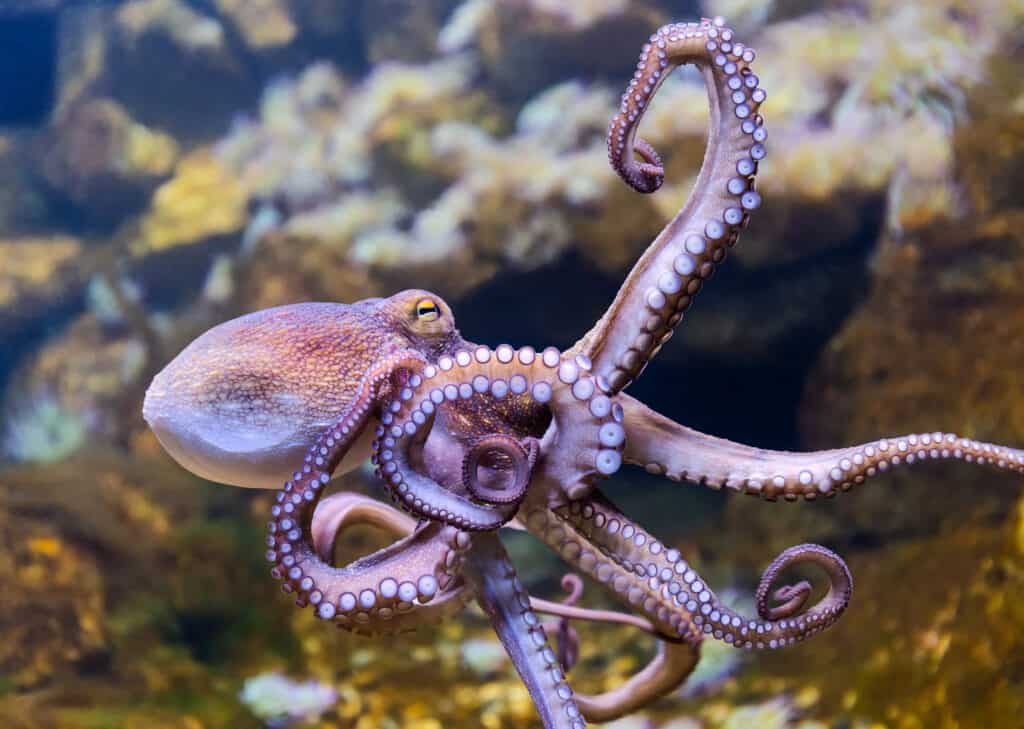
The octopus is an incredible creature and has nine brains.
©Henner Damke/Shutterstock.com
Even when people can accept and understand that animals can feel and understand pain like we do, they often only apply this to other vertebrates like ourselves that act in ways we understand. For example, a dog might yelp or scream when it gets hurt — but how does an octopus express itself?
Unlike dogs or humans, octopuses do not cry out when they are in pain. In fact, if you really think about it, octopuses are pretty foreign creatures compared to humans:
- We have two arms and two legs, while an octopus has eight limbs!
- Humans live on land, while octopuses live exclusively in the ocean.
- We taste with our tongues. An octopus, on the other hand, can taste everything it touches with the sensitive suckers on its eight limbs.
- A human may have an impressive brain, but they only have one. An octopus, on the other hand, has nine brains, with one found in each of its eight tentacles.
So, as you can see, it’s quite a challenge to decipher whether or not octopuses feel pain.
How Do We Measure Pain in Octopuses?
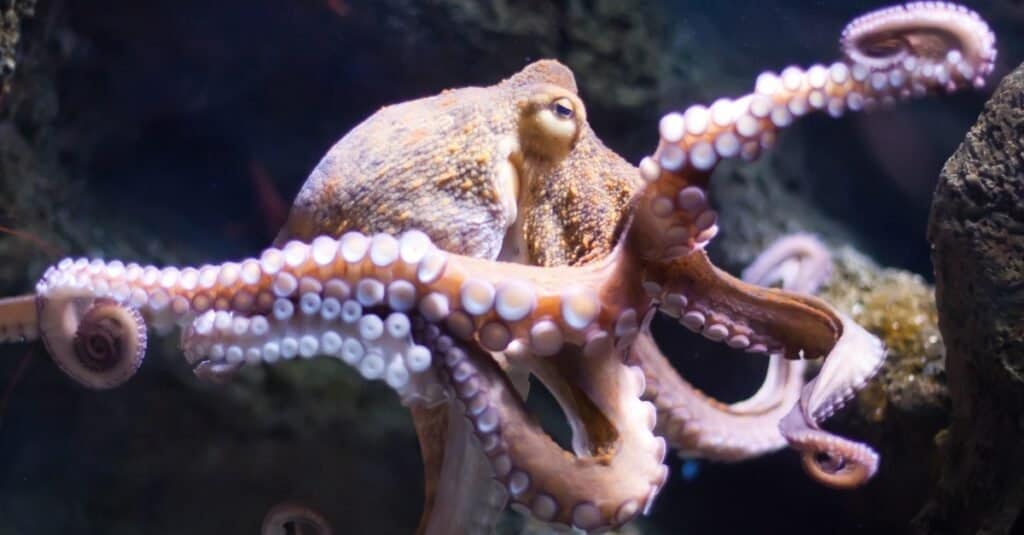
There are nearly 300 species of octopus in the world’s oceans.
©iStock.com/aurigadesign
Since an octopus cannot directly tell us that it is in pain, it can be pretty tricky trying to figure it out! However, we can look at how an octopus behaves in different situations. For example, scientists have found that many animals — including octopuses — try to avoid painful situations, discomfort, and places that might be dangerous. Animals in pain also tend to act differently. They may be less active than usual, may not want to eat food, or may not pay attention to those around them.
In addition, researchers at the London School of Economics (LSE) recently came up with a list of criteria to measure pain in octopuses. After analyzing over 300 scientific papers and studies, the group came up with eight criteria to help them understand if an animal can feel pain. Octopuses met almost all of the criteria with either very high or high levels of confidence. There was only one that had a medium level of confidence.
Do Octopuses Feel Pain?
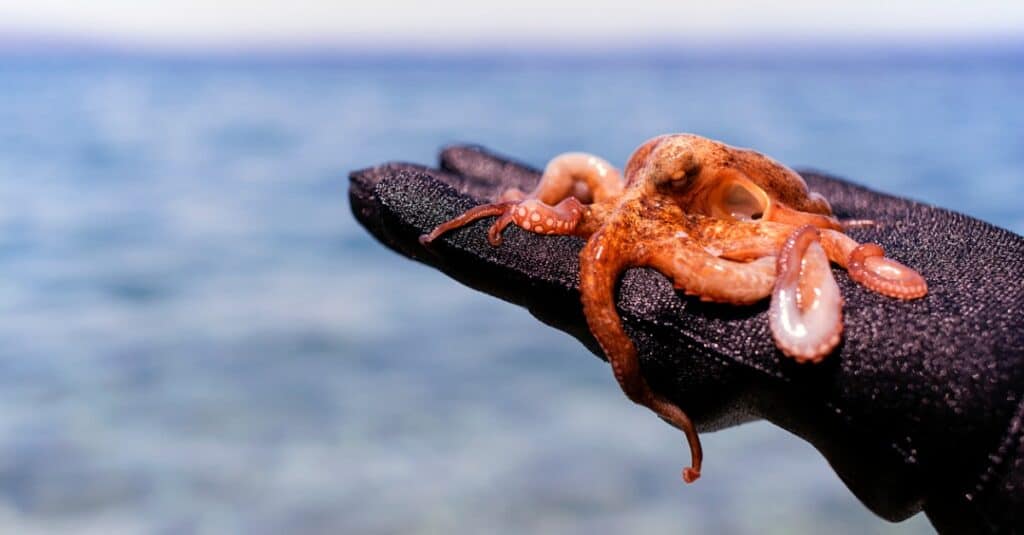
The answer to do octopuses feel pain is yes.
©iStock.com/feyyazalacam
As shown by the LSE study, yes, octopuses do feel pain! Moreover, Frans de Waal and Kristin Andrews demonstrated that even when they are not in pain, octopuses can remember previously negative experiences and avoid places where these happened. This means they have feelings and memories of events, even if those experiences didn’t involve physical pain. In other words, not only do octopuses feel physical pain, but they also feel emotional pain as well!
So, if an octopus can feel physical and emotional pain, how does that change our relationship with them? The scientific report generated by the LSE team proves that cephalopod mollusks (like octopuses), and decapod crustaceans (like crabs), can feel and express their emotions. Because of this, an amendment was made to the United Kingdom’s Animal Welfare (Sentience) Bill. This officially recognized these animals as sentient creatures.
Scientists further suggest that these animals should not be boiled alive. They also should not be sold live to people without proper training in their handling. In other words, if an octopus has emotions and feelings, it’s probably not morally sound to boil it alive or treat it poorly.
One of the LSE researchers, Heather Browning, explains, “The mind of an octopus may be highly different from our own, but it is only by trying to see the world from their point of view that we will be able to find out what is good for them and hence ensure their welfare.”
Octopuses are still mysterious creatures, but these cephalopods experience a wide range of emotions — including joy, anger, fear, and curiosity. So, the next time you see an octopus in a tank, think twice before you assume it is just a brainless blob. This fascinating sea creature could be feeling something deep inside!
Up Next:
- Watch the Moment This Octopus First Meets a Teddy Bear
- Watch a Huge Octopus Steal a Photographer’s Equipment and Refuse To Let Go
- Watch an Octopus Ace an Intelligence Test With an Unexpected Solution
- Do Octopuses Die After Giving Birth?
The photo featured at the top of this post is © Henner Damke/Shutterstock.com
FAQs (Frequently Asked Questions)
Do octopuses feel pain?
Yes, recent scientific research has confirmed that octopuses feel both physical and emotional pain.
What is the criteria for determining if an animal can feel pain?
The LSE researchers came up with eight criteria during their study, including:
- Does the animal have nociceptors (special receptors that help them detect things that could be dangerous, like if something is too hot)?
- Does the animal have regions in the brain that can help them understand, integrate, and use sensory information? (That is, can they make sense of things that they see, hear, smell, and touch? What is their learning ability like?)
- Are these elements (nociceptors and integrative brain regions) connected?
- Is the animal affected by analgesics or anesthetics (medications used to block brain signals so that even when you feel a sensation in your body, it doesn’t hurt)?
- Does the animal experience and utilize motivational trade-offs, or balance risks against potential rewards?
- Are the animal’s self-protective behaviors flexible? That is, can these animals use creative strategies (not just instinct or unconscious responses) to protect themselves?
- Does the animal use associative learning beyond sensitization (becoming more aware of something) and habituation (getting used to something)?
- If the animal is affected by analgesics or anesthetics (#4), do they show a preference for or seek out such help when they are injured?
Thank you for reading! Have some feedback for us? Contact the AZ Animals editorial team.




